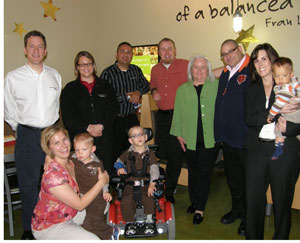by Beth Finke
With all the talk in the news lately about states cutting programs due to high budget deficits, it was interesting to read an article in the Chicago Tribune last weekend about families with disabilities leaving the Chicago area to move to other states. The story says there is no statistical study about why families with disabilities might leave one state for another, but anecdotal evidence suggests that many parents of children with disabilities here in the Chicago area plan to leave— or have already left — because of the lack of funding for human services here. The writers interviewed the mother of a seven-year-old named Jeffery who has autism:
One week after Patrice Evans’ preschooler was diagnosed with autism, her Grayslake Illinois home was on the market and she was headed to Kenosha for Wisconsin’s generous funding of intensive therapy.
My husband and I have known for years how poorly the State of Illinois ranks when it comes to funding programs for people with disabilities. Despite Wisconsin’s battered economy, the state allocates more resources than Illinois does to children like our son Gus. The Tribune story confirmed what we knew already, reporting that United Cerebral Palsy ranks Illinois 48th out of 50 for providing services, and University of Colorado’s Coleman Institute of Cognitive Disorders puts Illinois near the bottom for funding autism spectrum disorders.
Perhaps that is why about one-third of the parents in the Kenosha-area autism support group are Illinois refugees, said Farrah Sonnenberg, Geoffrey’s service provider.
When it came time for our son Gus to move away we placed him in a group home in Wisconsin. It’s difficult to visit him regularly from faraway Chicago. We would rather have him close to home. Just like the families in this Tribune story, though, we feel more confident about services in Wisconsin, and we often talk about relocating there ourselves.
Easter Seals has prepared a state-of-the-states report on autism services that is a comprehensive and objective resource on how the fifty states, District of Columbia and Puerto Rico are responding to the needs of individuals living with autism spectrum disorders, including the 23 states that have passed autism insurance legislation.
The profiles highlight the number of children with autism who have received the state’s special education services, state insurance coverage for autism if available, Medicaid services specific for individuals with autism, educational programs provided to students with autism or training that focused on autism, special education criteria, other state-led resources, and sponsors of autism legislation. I encourage you to give our State Autism Profiles a look. The profiles are a very helpful resource when you’re thinking about making difficult — and life-changing — decisions for you and your family.







 For a while there we were worried it might never happen, but the weather finally did warm up, and summer is here at last. So stoke up the barbecues! Enjoy some outdoor festivals! Eat bags of cookies!
For a while there we were worried it might never happen, but the weather finally did warm up, and summer is here at last. So stoke up the barbecues! Enjoy some outdoor festivals! Eat bags of cookies!